Ranjani Priya, D. V. N. L. Saisri, B. Rajya Lakshmi, B. Sirisha and B. V. L. Sowmya share their experiences as participants at the National Conference on Scaling-up of livestock extension innovations for doubling the farmers’ income.
CONTEXT
Livestock is a livelihood option for a majority of farmers in India. While livestock production contributes immensely towards the country’s agricultural economy, it is often not an economically viable proposition for small-scale farmers for several reasons. The annual Indian Veterinary Extension Forum (IVEF) conference on “Scaling-Up of livestock extension innovations for doubling the farmers’ income” held at Ranchi, Jharkhand during 4-5 November 2022. The conference was hosted by the Department of Veterinary & Animal Husbandry Extension of Ranchi Veterinary College under the Birsa Agricultural University, Ranchi, Jharkhand.
The conference was inaugurated by Mr. Onkar Nath Singh, Vice-Chancellor of Birsa Agricultural University. This was followed by three keynote presentations. Drs. K.C. Veeranna, Vice-Chancellor, Karnataka Veterinary, Animal and Fisheries University (KVAFSU), Bidar, Karnataka spoke about livestock extension strategies for the sustainable development of the livestock sector. Stating that there is no single magic bullet in extension strategy that works in all situations, he said choosing a suitable strategy and implementing it are the keys to success. He also emphasized that the prosperity of farmers hinges on strengthening the linkage between institutions with regard to research and extension activities. He cited the examples of extension programs like Kisan Sampark Sabhas, health and infertility camps, special livestock breeding programs to improve the capacity of farmers in addition to diploma courses, trainings, and entrepreneurship programs for effective dissemination of information to boost the livestock sector.
In his presentation, Dr. S.V.N. Rao, former Professor & Head of the Department of Veterinary & Animal Husbandry Extension Education, Rajiv Gandhi Institute of Veterinary Education and Research (RIVER), Puducherry focused on the challenges faced by small-scale livestock farmers, such as the declining income of producers and the mismatch between farmers’ needs and research goals. He also reiterated that for effective delivery of Extension Advisory Services (EAS), extension workers have to synchronize multiple service providers like the Animal Husbandry Department, dairy co-operatives, Krishi Vigyan Kendras, poultry integrators and Non-Government Organizations (NGOs). Moreover, farmers also need to be made aware of the advantages of quality veterinary and EAS and be informed about the benefits of paid services which are demand driven.
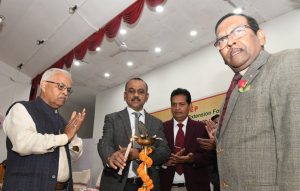 Inaugural Session
Inaugural Session
Dr S. Ram Kumar, Professor, RIVER, highlighted the importance of awareness about rapidly changing developments in the livestock sector and the need to follow a wheel and axle model, in order to transcend the conventional concept of extension given the wider reality in the changing world. He emphasized how veterinary extension professionals must keep themselves updated of developments in their field in order to deal with emerging challenges. Also present at the conference were Mr. Sushil Prasad, Dean, Ranchi Veterinary College; Dr. N.K. Sudeep Kumar, President, IVEF; Dr. Alok Kumar Pandey, Vice-President, IVEF; and Mr. V.K. Bist, Chief General Manager, National Bank for Agriculture and Rural Development (NABARD).
TECHNICAL SESSIONS
Global and national level developments and models in livestock Extension and Advisory Services (EAS)
In this session, Dr. Arunasis Goswami Professor, University of Animal and Fishery Sciences, West Bengal focused on the management of conflict and stress to ensure efficient performance by livestock extension agencies. He shed light on process and structural models that can resolve these conflicts, and how identifying the pressures and constraints can lead to a dynamically functioning organization. Dr. Akila, Professor and Head, Veterinary College and Research Institute, Namakkal in her presentation on national level models in livestock extension dwelt on different models such as public-private partnership, pluralistic extension, market-led extension, and farmer-led extension available in livestock extension advisory systems. Dr. Pankaj Kumar, Associate Professor and Head, Bihar Veterinary College, Patna explained the potential and performance of the Agri-Clinic and Agri-Business Centers (ACABC) scheme in India, and elaborated on their role in providing a wider variety of services to the farming community.
ICT-Based EAS and models
The presentation on ICT-enabled livestock extension by Dr. B.K. Jha, Birsa Agricultural University, Ranchi provided an overview of the role of ICT in disseminating information on health care, insurance and marketing through mobile applications (Pashu Poshan, Cattle Expert System), Artificial Intelligence (AI), Machine Learning (ML), Internet of Things (IoTs) and drones. Dr. Sariput P. Langde’s (Nagpur Veterinary College) presentation focused on the development of Android-based mobile applications for livestock farmers, identifying and prioritizing the needs of farmers, and conducting a pilot study to assess the effectiveness of the application.
Entrepreneurial competencies, incubation, startups and challenges in the livestock sector
In this session, Dr. T.S. Rajeev from Kerala Veterinary and Animal Science University (KVASU) focused on experiences from multilevel interventions through the village adoption program for livelihood security among tribal folk in Kerala. He pointed out how the program had brought about positive changes among tribal people, helped in creating a sense of community and togetherness among the beneficiaries and enhanced their confidence. Dr. Nisha from TANUVAS shared her experiences in implementing livestock interventions in Kancheepuram district in Tamil Nadu, and highlighted the importance of the right technological interventions for improving the productivity of animals. Dr. Anjana, NTR College of Veterinary Sciences, Gannavaram in her presentation, advocated the wider promotion of sex sorted semen technology.
EAS strategies in emerging areas
The lead paper in this session was presented by Dr. N.K. Sudeep Kumar, Director of Extension, TANUVAS. He addressed the issue of research gaps in livestock extension and the need for both generalists and specialists among livestock professionals. According to him, generalists have a wide range of interconnectedness and skills and can offer multiple services. Specialization brings in more efficiency, improved quality and vast knowledge is broken into more manageable bits. He also stressed on the need to develop appropriate mechanisms to strengthen farmer-extension-research linkages. Dr. Kumar also elaborated on the need for a paradigm shift among animal science researchers and extension workers from being generalists to becoming specialists. Dr. M. Rajalakshmi, RIVER, Puducherry focused on an effective extension service that is the sine qua non for fostering the development of poultry farmers into entrepreneurs.
Opportunities and challenges of livestock-based farmers’ collectives
Dr. K. Nachimuthu from RIVER highlighted the challenges and opportunities faced by various farmers’ collectives such as self-help groups, co-operatives and Farmer Producer Organizations (FPOs) and the reasons for their success and failures. Dr. Alok Kumar Pandey, Professor, Ranchi Veterinary College highlighted the role of FPOs in the livestock sector, how farmers benefit as well as the challenges faced by them. Dr. Devesh Thakur from CSK Himachal Pradesh Agricultural University shared his experience with setting up nine community fodder banks in wastelands across several village panchayats in Kangra district of Himachal Pradesh.
Research and EAS in livestock-based integrated farming systems
In his presentation, Dr. Alok Kumar Pandey demonstrated the field benefits and constraints of various approaches of Integrated Farming Systems – crop-livestock, crop-livestock-fish, crop-livestock- backyard poultry, crop-livestock-fishery biogas/ vermicomposting system and small ruminant silvi pastoral. Comparing conventional farming systems and integrated farming systems, he emphasized that while the former doesn’t fulfill farmers’ household requirements, the latter enhances productivity and profitability, is sustainable, ensures food security for farmer families, provides a safe environment by effective recycling, and ensures income round the year. He opined that an integrated livestock farming system not only ensures economic returns but also generates employment and maintains ecological balance through environment protection.
The technical sessions were followed by a poster session for post-graduate students. In the poster presentation on Constraints perceived by farmers in backyard poultry rearing, Dr. Saisri dwelt on the need for strategic and systemic training to overcome constraints to achieve maximum benefits. Dr. B. Sirisha presented a poster on the Role of EAS in tackling biological disasters (the case of LSD outbreak in Andhra Pradesh), wherein she elaborated on the measures being taken by the state to create awareness among farmers during disease outbreak. Presenting her poster on Backyard poultry farmer producer organizations: a drive for doubling farmers’ income, Dr. B. Sowmya explained how FPO’s were promoting the livelihood security of rural farmers by providing services like input supply, procurement, collective farming, marketing linkages and improving backyard poultry varieties.
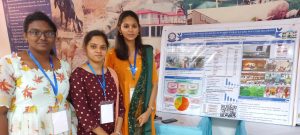 Poster Presentation by MVSc Students
Poster Presentation by MVSc Students
The conference concluded with awards for the best presentations. The 9th IVEF conference introduced two more awards, i.e., National Fellow Award and Women Extension Scientist award apart from Best Paper presentations and Young Scientist Award. The National fellow Awards went to Dr. K. C. Veeranna, Vice-Chancellor, KVAFSU and Dr. S. Ram Kumar, RIVER, while Dr. N. Akila, Professor and Head, Veterinary College and Research Institute received the Women Extension Scientist Award.
The research paper “Constraints perceived by farmers in backyard poultry rearing” by Drs. Saisri, Ranjani Priya, and Rajya Lakshmi based on a survey conducted in Krishna district of Andhra Pradesh bagged the first prize while the second prize for best poster on the “Role of EAS in tackling biological disasters – Case of LSD outbreaks in Andhra Pradesh” went to Dr. Sirisha.
This first exposure to a national conference was truly an eye-opener for us. The insights, depth of information and identification of constraints and opportunities for scaling-up livestock extension innovations that the veterinary extension professionals provided were absorbing and highly instructive. On the whole, the conference was planned meticulously.
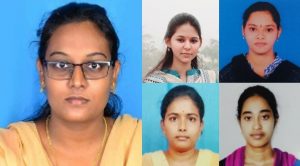
Dr. K. Ranjani Priya (ranjanipriya135@gmail.com), Dr. D. V. N. L. Saisri (lakshmisaisri.1997@gmail.com), Dr. B. Rajya Lakshmi (rajyalakshmi.bethapudi@gmail.com), Dr. B. Sirisha (sirishabora1996@gmail.com), Dr. B. V. L. Sowmya (sowmisowji4@gmail.com) are P G Scholars at the N T R College of Veterinary Science, Sri Venkateswara Veterinary University. Tirupati, Andhra Pradesh, India

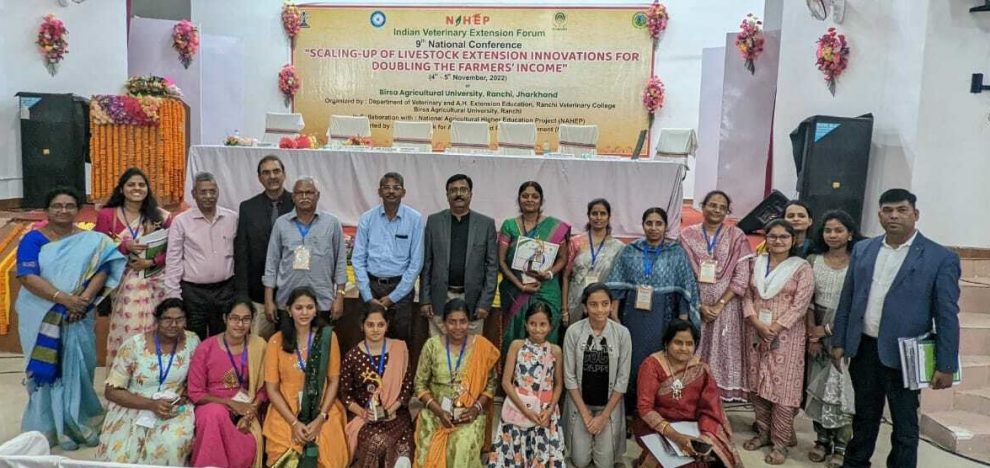

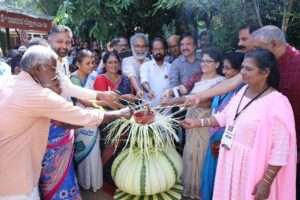

Congratulations to the budding vety extension professionals to share their experiences of attending the national conference organised by IVEF at Ranchi. Thanks to Dr. Subrahmanyeswari B. for motivating the youngsters to write the meeting notes and to Dr. Rasheed V Sulaiman for encouraging them by posting in the website.